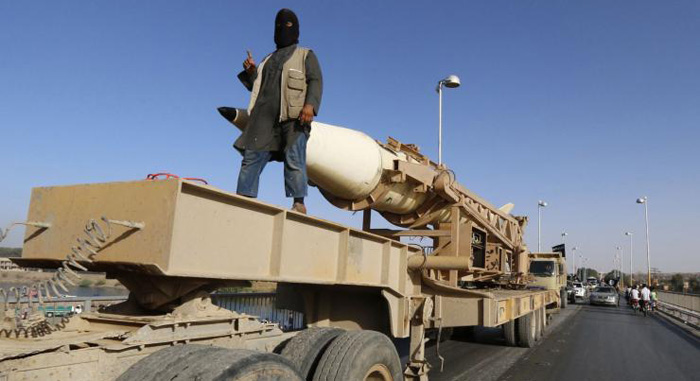ISIS militants have been producing weapons on a scale and sophistication which matches national military forces and have standardized production across their self-styled caliphate, an arms monitoring group said on Wednesday.
Conflict Armament Research (CAR) said the jihadist group had a "robust supply chain" of raw materials from Turkey, and the technical precision of its work meant that it could not be described as "improvised" weapons production.
"Although production facilities employ a range of non-standard materials and chemical explosive precursors, the degree of organization, quality control, and inventory management indicates a complex, centrally controlled industrial production system," it said in a report following visits last month to six facilities once operated by Islamic State in eastern Mosul.
Iraq's military launched a sweeping operation on Oct. 17 to retake the northern city, the jihadists' last major stronghold in the country, more than two years after government forces dropped theirweapons and fled.
Elite army troops have retaken a quarter of the city in a grueling U.S.-backed campaign, but their advance has been slow and punishing. Soldiers are constrained by street-by-street fighting and a built-up urban battlefield.
CAR, which identifies and tracks weapons and ammunitions in conflicts, said the facilities it visited were part of a system producing weapons according to precise guidelines issued by a central authority.
Production included a monitoring system with regular, detailed reports on production rates and quality that helped ensure standardization - usually to the tenth of a millimeter - across the jihadists' once sprawling territory in Iraq and neighboring Syria.
"Mortar rounds manufactured in one part of IS forces' territory are calibrated to fit mortar tubes produced in facilities located elsewhere," the report said.
CAR investigators estimated that Islamic State had produced tens of thousands of rockets and mortar rounds in the months leading up to the Mosul offensive.
Standardization required consistency in the supply of source materials, the report said, achieved through a major acquisition network in neighboring Turkey and a supply chain extending from that country, through Syria, to Mosul.
In addition to technical advantages of standardization, CAR said Islamic State sought to mirror the functions of a national military force in a bid to "legitimize the group's capacity and coherence in the eyes of IS fighters".
The monitor also said documents it had seen in Mosul suggested Islamic State had provided its fighters with sophisticated instructions on making and planting improvised explosive devices as well as the operation of complex weapons systems, such as anti-tank guided missiles.







Comments